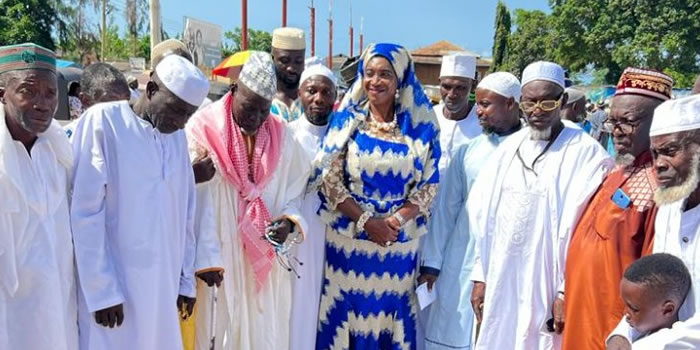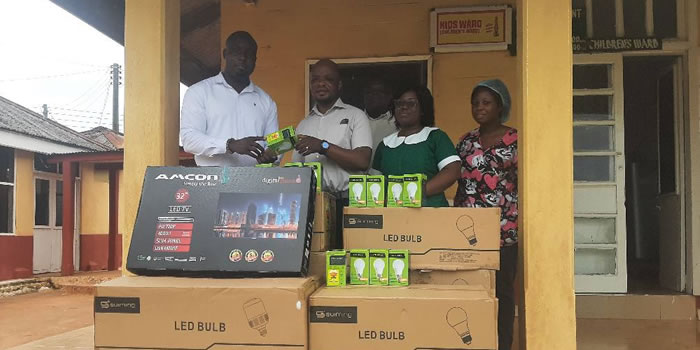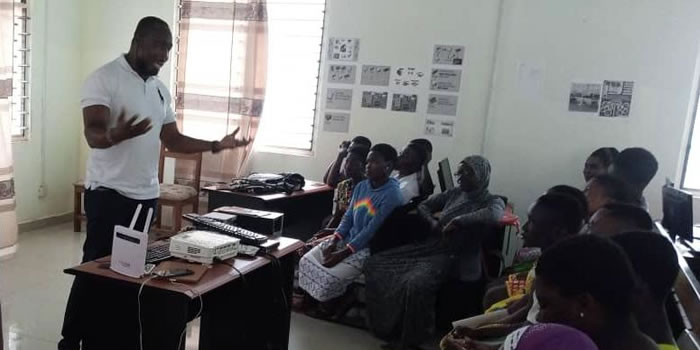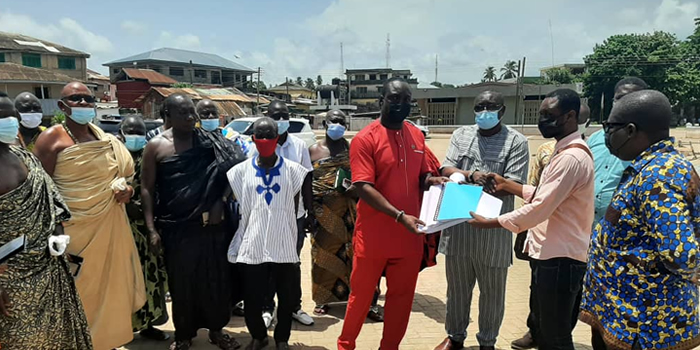

DEVELOPMENT FOCUS, GOALS AND OBJECTIVES
Development Focus
• The Development Focus of the Nzema East Municipal Assembly is to ensure that all the inhabitants of the District have the following:
• Access to basic social services such as Health Education, Potable water and descent Housing and clean environment
• Improved urban and Feeder roads
• Adequate incentives to increase production
• Security from crime and violence
• The ability enabling environment that will empower all stakeholders to participate fully in the Municipal’s development effort.
Development Goal
Based upon the problems, needs opportunities and constrains, and priorities identified, the overall Goal of the Nzema East Assembly in line with the GPRS II Themes is:
• To improve the living conditions of the People through sustainable growth and equitable Poverty reduction.
Formulation of objectives and strategies
The Assembly believes that if the living conditions of the people, especially the majority of the Rural People, are improved y raising their productivity and income levels and their involvement in Decision making, their total contribution to both local and National developments will be greatly enhanced.
DEVELOPMENT GOAL, OBJECTIVES AND STRATEGIES (2010-2013)
MUNICIPAL DEVELOPMENT GOAL
To improve the living conditions of the people through sustained microeconomic stability, private sector. Competiveness, Agriculture Modernization, Human Resource Development and Expansion of Productive Infrastructure within a Transparent and Accountable Decentralized Governance.
Theme 1: Enhancing Competiveness in Ghana’s Private Sector Trade, Industry and Commerce
Objectives:
To increase access to credit facilities and other support services to groups and Small Scale Enterprises by December 2013.
Strategies:
• Construction of light industrial zone
• Construction of Lorry Parks
• Construction of Markets for selected towns
• Provide Micro Credit facilities to SSEs through MASLOC, Nzema Manle Rural Bank, Lower Pra Rural Bank
Tourism
Objectives:
To develop and promote tourism in the Municipality
• Encourage Private Sector participation in the development of Tourism sites
• Enhance the Tourism potential in the Municipality through advertisements
• Develop other cultural potentials
• Improve and Expand post and Telecommunication facilities
• Improve the road network
• Prepare Tourism Development Plan
• Organize stakeholder’s fora on the Tourism potential
Theme 2: Accelerated Agricultural Modernization and Sustainable Natural Resource Management
Agriculture Modernization
Objectives:
• To facilitate the modernization of agriculture production to achieve food sufferance and security through extension services
• To strengthen the institutional capacity of Agric Development and functional linkages between agric and others sectors in the Municipality.
• To minimize the impact of environmental degradation by promoting the use of environmentally friendly technologies and practices especially among farmers and Small Scale miners
• To increase income levels among farmers through the promotion of alternative livelihood and non crop agriculture
• To increase access to marketing centres by improving and extension of Feeder Roads to food producing areas
• To facilitate farmers / processors / FBOs access to credit, storage, market and other facilities
• To ensure stable price for farmers and food security through the provision of storage facilities
Strategies:
• Organize 10 fora for 1500 farmers and 10 agro inputs dealers in safe use of agro chemicals annually
• Carryout 100 demonstration on row planting for optimum yields for 5000 farmers
• Carryout 3 demonstration on improved rice production for 30 farmers
• Carryout 5 blocks of maize production field for 50 farmers by April annually
• Train 200 farmers on the multiplication of improved cassava planting materials
• Conduct 10 demonstration for 200 farmers on production of plantain suckers
• Carryout 30 demonstrations on improved practices to increase yield of maize and cowpea
• Train 5 FBOs on group dynamics and credit management
• Train 200 producers, processor and markets in post harvest handling of penshables
• Train 10 caterers on fortification of staples chining processing and link to School Feeding Programme
• Train 100 fishermen/fishmongers in improved culture fisheries and technologies
• Set up 5 demonstration on improved housing for sheep and goats in 5 communities
• Train farmers in 28 communities on use of 12 control new castle disease in local poultry
• Organize training for 100 farmers in pig production and management
• Train 10 livestock workers to act as community service agents
• Organize 2 workshops for 30 farmers on improved cockerel production
• Educate 10,000 people on avian HINI influenza
• Develop and run 50 technologies for extension delivery through radio
• Train 300 farmers on improved plantain cultivation
• Carryout 15 demonstrations on fertilizer use and soil improvement practices for 300 farmers
• Organize 5 workshops on livestock management and record keeping for 200 farmers
• Vaccinate 5000 sheep, goats, pigs, dogs and cattle against scheduled diseases
• Organize 10 workshops on marketing of exportable agriculture commodities for 500 producers annually
• Establish one agric extension information centre by December 2011
• Conduct 120 demonstration and field days for 3000 farmers to enhance adoption of technologies
• Train 20 management/field staff in ICT skills for effective extension delivery
• Carryout 480 supervisor visit by 4 DDOs
• Organize weekly monitoring visits by DDA
• Organize Farmer Day Celebration by December annually
• Acquire protective clothing and field equipment for staff
• Procure photocopier, scanner and generator for office use
• Rehabilitate 5 staff quarters by December 2011
• Training of 100 fish farmers in pond construction, pond management, stocking, feeding, investing and record keeping through
demonstrations / field days and workshops
• Train 500 fishermen on the use life saving equipment and navigation at sea through workshops and demonstrations
• Train 500 fish processors / mongers in modern fish presentation methods and Hygeia
• Monitor and provide extension / technical assistance to fishers and stakeholders
• Educate the general public / fishing communities on the fishers Act 625, LJ 1968 and negative effects of in appropriate fishing methods through the Local FM station
• MOFA Farmers Registration (MFR)
• Cocoa man spraying programme (CMBO)
• Youth in Agriculture
• Carryout 10 demonstration for 50 selected vegetable farmers (Garden eggs, peppers and okro) production
• Organize 50 fora on behavioral changed in collaboration with MOH as a way to control HIV/AIDS
• Educate and Train 500 farm families on planning nutritionally adequate diet, based on the three main food groups
• Support farmers with inputs and loan facilities
• Resurfacing of Feeder Roads for food producing areas
Natural Resource Management
Objectives:
• To ensure a disaster-free environment in the Municipality
• To improve the sanitation situation in the Municipality
• To supervise and control the use of natural resources
Strategies:
• Enforce relevant environmental bye-law to protect to protect the environment at all level
• Encourage re-afrestation of degraded forest and off resaved areas
• Encourage the cultivation of wood log for charcoal burning
Theme 3: Infrastructure, Energy and Human Settlement Development
Roads and Transport
Objectives:
• To ensure safe and affordable mode of transport by December 2013
• To rehabilitate Road Network in the Municipality by December 2013
Strategies:
• Rehabilitate selected roads totaling 200km
• Construction of New Roads
• Grading and resurfacing of roads
• Training of Roads
• Construction of footbridges
• Construction of culverts
Water
Objectives:
• To increase potable water coverage from 45% to 79% by December 2013
• To strengthen the operation and maintenance of water systems in all beneficiary communities by December 2013
• To ensure that river bodies are kept clean to save surrounding areas by December 2013
Strategies:
• Construct 100 boreholes in needy communities
• Construct 2 small town water systems in the Municipality
• Rehabilitate/redevelop broken-down water facilities
• Construct 80 hand dug wells with pumps in needy communities
• Organize training programmes for WATSAN committees on Zonal Council basis
• Organize annual routine maintenance training programme for pump caretakers and area mechanics
• Carryout monthly monitoring activities in all beneficiary communities
Objectives:
• To promote Information and Communication Technology in the Municipality
• To effectively monitor he operations and services of the Telecommunication services
Strategies:
• Construct and equip ICT centre in Axim
• Encourage the Private Sector to establish more ICT facilities in the Municipality
Energy
Objectives:
• To increase the energy supply from 40% to 70% by December 2012
Strategies:
• Connect 24 settlements to the National Electricity Grid
• Extend Electricity to newly development communities
• Encourage investors to pen LPG accessories sales point
• Provide street lights in needy communities
Theme 4: Human Development, Productivity and Employment
Objectives:
• To increase access to and participation in education and training all levels by December 2013
• To increase by 5% the percentage of first year intake by December 2013
• To reduce drop out rate from 15% to 10% at the basic level by 2013
• To identify and promote ST, HIV/AIDS prevention, care and support at all levels of education by December 2013
• To promote and increase school environment at all levels of education by December 2013
• Promote and increase trained teachers by 10% to ensure quality education delivery by December 2013
• To improve Science, Maths Technology and ICT education and training at pre-tertiary level of education by December 2013
Strategies:
• Organize enrolment drives in communities
• Organize one week clinic for students annually
• Provide materials support to needy pupils in 20 schools
• Sustain Capitation Grant
• Expand the School Feeding Programme in basic schools
• Conduct STD, HIV/AIDS awareness for 30 basic schools in the Municipality
• Provision of basic building materials for community initiated projects
• Construction of 15 No. 2 Unit Classroom Blocks and ancillary facility for KGs
• Construction of 15 No. JHS Blocks
• Construction 12 No. 6 Unit Classroom Blocks
• Provision of 10 No. 4 Unit teachers accommodation
• Sponsorship for 30 teachers trainees
• Rehabilitation 4 No. school blocks
• Annual Best Teacher Awards for teachers
• Establish and ensure the proper functioning of SMCs and PTAs in all schools
• Organize IN SET for teachers professional development
• Provide support for teachers on UTDBE and distance programmes
• Conduct NEA and SEA test for Primary School pupils
• conduct Mock Exams for JHS finalists and promotion exams for Primary Six pupils
• Organize ………… and art competition among basic and SACs
• Provide INSET for Science, Maths Technology and ICT teachers in both basic and SHS
• Provide 20 resource centres, computers and accessories and other scheme teaching and learning materials to all schools in pre- tertiary level of education
• Technical and Vocational schools
• Provision sport / culture facilities and equipments
Objectives:
• To increase geographical access to basic health services in deprived areas through the provision of additional CHPS centres by December 2013
• Improve access to financial and health care by extending the municipal Mutual Health Insurance Scheme on December 2013
• Improve efficiency in service delivery in the health sector through institutional strengthening by December 2013
• To reduce HIV/AIDS, TB and Malaria cases by 50% through intensive public education programmes by December 2013
Strategies:
• Intensify disease surveillance and response on
• TB
• Malaria control programmes
• HIV/AIDS control programmes
• Polio eradication and other diseases
• Construction of 7 No. CHPS centres
• Construction of 6 No. Clinics and Nurses Quarters
• Train 130 chemical sellers, Teachers Communication diseases
• Organize community based surveillance for 100 volunteers training on simple communicable diseases
• Increase family from 20% to 40% and average family size reduce from 5 to 4
• Increase EPI coverage from 82% to 90%
• Train 20 TBAs in ANC delivery and PNC
• Increase supervise delivery skills from 40% to 50%
• Organize quarterly review meetings between MAMT, MA and beneficiary communities on implementation of projects
HIV/AIDS
Objectives:
• To reduce the incidence of HIV/AIDS and other STDs among the high risk groups in the Municipality (youth, female sex, workers, minors) by 50% by December 2013
• To improve care and support services for people living with AIDS by December 2013
• To improve the service delivery capacity of six (6) Registered NGOs and CBOs by December 2013
Strategies:
• Organize 4 number workshops for Municipal officers, youth leaders, community leaders on HIV/AIDS and STDs prevention and control
• Organize quarterly workshops for Zonal Councils, CBOs, NGOs and other stakeholders on main streaming their activities into the local level
• Support and advocate for improved access and resources (micro credit, nutrition etc.) for PLWHAS
• Organize skill training and increase generating activities for 30 PLWHAS
• Institute work place policies for reducing the impact of the epidemic on employees and employers
• Organize quarterly panel discussion on HIV/AIDS and STDs at the local FM stations
• Establish 20 HIV/AIDS material point at libraries, market and public places
• Scale up care and support including ART services for PLWHAS
• Involve NGOs, CBOs and Public Sector in the provision of care support for PLWHAS
Employment
Objectives:
• To create job avenues for the youth through skills and entrepreneurial training and investment support for self employment by December 2013
Strategies:
• Recruit, train and employ 479 youth for sanitation and waste management
• Train and support 500 youth in grasscutter and snail rearing and vegetable farming
• Recruit, train and employ 200 unemployed youth to teach in the basic schools
• Recruit and train 30 unemployed youth for community policing
• Recruit and employ 150 unemployed youth into Information and Communication Technology (ICT)
• Recruit and employ 300 unemployed youth in Dressmaking, Hairdressing and Mobile Phone repairs
Vulnerable and the Excluded
Objectives:
• To improve the well being of vulnerable groups in the Municipality (physically challenged, women and children) by December 2013
• Identify, register and monitor the operations of early childhood development centres
• Organize training for 60 untrained KG and Nursery attendants and proprietors
• Organize education programmes on the right of children
• Facilitate the formation of child panels
• Provide employable skills to delinquencies and street children
• Support poor families with credit facilities / income generating activities
• Provide vocational skills for unskilled people with disabilities (PLWDs)
• Monitor the activities of NGOs, CBOs on handling groups
• Equip the Municipal Social Welfare Department with furniture and other logistics
Theme 5: Transparent and Accountable Governance
Objectives:
• To strengthen service delivery capacity of the Assembly by December 2013
• To promote Community Participation in planning and implementation of development activities in the Municipality by December 2013
• To reactivate the three Zonal Councils through finding support and training by December 2013
• Improve the efficiency in the revenue collection machinery of the Assembly by December 2013
Strategies:
• Completion of Municipal Assembly Hall Complex for Nzema East Municipal Assembly and other Decentralized Departments
• Completion of community centre at Axim
• Reactivate Municipal Sub-Structures (Zonal Council)
• Construct 1 No. Zonal Councils offices at Nsein
• Equip Sub-Structures with logistics, furniture and staff
• Construct 20 No. Community Sheds
• Organize quarterly meetings with Heads of Departments and Agencies
• Organize quarterly review fora on development projects at all Zonal Council levels
• Organize refresher training programmes for revenue collectors
• Institute incentives scheme and reward systems for collectors
• Organize workshop in project management for Staff, Assembly members, Zonal Councils and Unit Committees
• Organize half yearly fora/interface in the Municipality on the Nzema East Municipal Assembly Medium Term Development Plan and other developmental programmes/projects
• Strengthen the M & E system of the Assembly
• Procure an additional vehicle for the Assembly to enhance monitoring
• Organize regular capacity building programmes for Assembly Staff
• Support decentralized departments with logistics
• Procure and install 1 No. generator for Administration
Monitoring And Evaluation
The monitoring and Evaluation will be done by the District Assembly through the District Planning and Coordinating Unit-DPCU and Sectoral Departments as indicated in the Annual Action Plan. Unforeseen changes in the Socio-Economic and Government Policies will affect the Plan. As a result there is the need for continuous monitoring and evaluation to enable the necessary adjustment and revision to be done.
Monitoring Report Monitoring starts with the implementation of the projects. It is aimed at making sure that the Project progresses according to laid down procedures, bill of quantitities, and scheduled as well as maintaining high quality standards. The District Monitoring Team will be responsible for the overall supervision of the Programme and Projects in the Annual Plan. A monitoring record will be kept during the implementation, which will form the basis of writing monthly monitoring report to the District Chief Executive and also to correct mistakes.
MONITORING AND EVALUATION ARRANGEMENTS (2010-2013)
Introduction
Plan implementation involves translating the programmes and project in the MTDP real action on the ground to achieve set objectives.
Implementation arrangement therefore provide information about what actions to be taken, who take them at what time where and who are responsible as well collaborating agencies e.g. Regular monitory of project implementation generates vital information on project performance.
The programmes in this MTDP have been phased in to annual plans which will be rolled into ensuring years. Monitoring would be guided by the indicators and targets identified in the programme of work as well as those defined under the GSGDA 1 thematic areas.
They include standard indications, Municipal specific indicators performance indicator impact indicators these indicators may not be exhaustive and static. They could be reviewed when the need arises.
For effective implementation, the roles and responsibilities of certain key institutions are specified below:
The following are some major functions expected to be performed by the Assembly during implementation
- Provision of policy guidelines for programme and project implementation
- Identification, invitation attraction for potential and investors into the Municipality to support implementation
- Identification appropriate response to implementation bottlenecks i.e. Legal, occasional and administrative issues
- Facilitating implementation process through effective and efficient flow of information among all collaborating agencies at all stages of plan implementation
- Ensuring regular monitoring and evaluation and periodic revision and adjustments of implementation procedures in response to changing circumstances
- Regular reporting to appropriate authorities (RPCU, NDPC, MLGRD etc.)
MUNICIPAL PLANNING CO-ORDINATING UNIT (MPCU)
The MPCU is the secretariat responsible for carrying out co-ordinating, integration monitoring and evaluation of programmes and projects.
To perform its functions effectively the MPCU shall carry out the following activities among others:
- Prepare and implement a detailed M&E plan for the Municipality
- Organize quarterly MMTDP performance review meeting with stakeholders (it is important that NDPC and RPCU are represented). And collate feedback for policy review and re-planning)
- Undertake periodic project site inspection
- Produce quarterly and annual progress reports and make recommendation for policy review based on findings and reactions
To carry out these roles effectively, the MPCU should co-opt representatives from other relevant sector agencies, such as the Private Sector and the Civil Society Organizations whose input will be needed. Also, there is the need to strengthen and equip this unit in order that it can carry out its functions effectively and efficiently.
DECENTRALIZED DEPARTMENT
Decentralized Department having made input into the MTDP are the initiators and facilitators of the various programme, under their sections. There is therefore the need for a closed technical, financial and human collaboration with the sector heads on such projects and programmes materials to ensure prudent rise of resources.
For effective reporting, sector heads are also expected to submit monthly / quarterly reports to the Assembly for
Date Created : 11/20/2017 2:00:50 PM
















 facebook
facebook
 twitter
twitter
 Youtube
Youtube
 +233 593 831 280
+233 593 831 280 0800 430 430
0800 430 430 GPS: GE-231-4383
GPS: GE-231-4383 info@ghanadistricts.com
info@ghanadistricts.com Box GP1044, Accra, Ghana
Box GP1044, Accra, Ghana